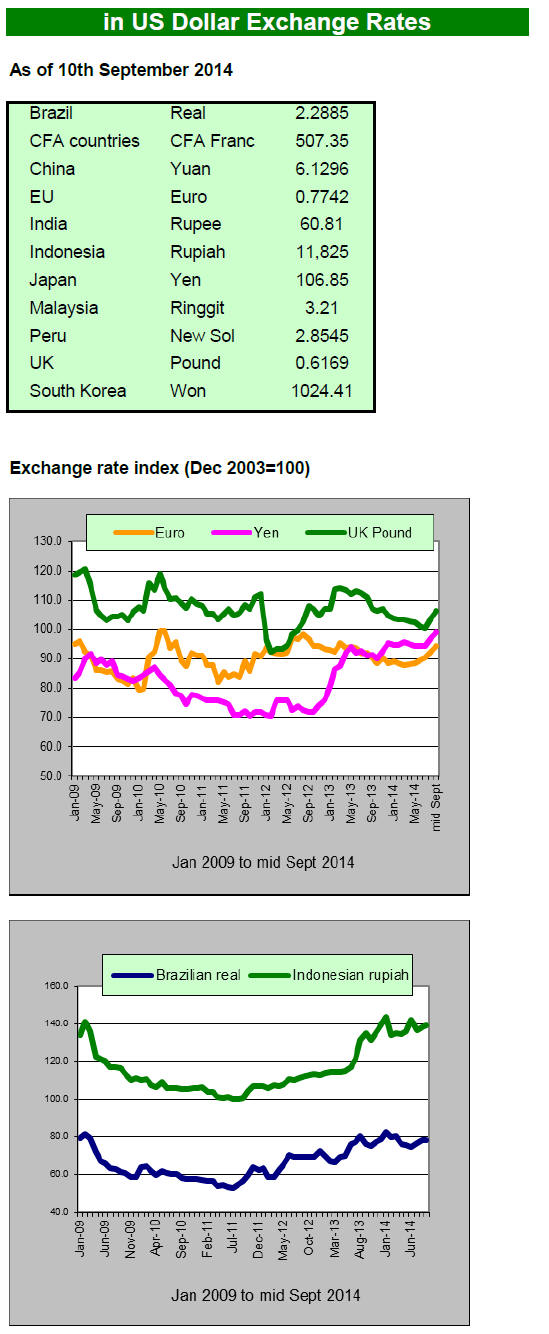2. GHANA
Exporters seek permission to conclude
rosewood
export contracts
The Importers and Exporters Association of Ghana has
urged the Ministry of Lands and Natural Resources to
amend the regulation putting a stop to rosewood exports.
This is because several companies had concluded contracts
prior to the ban on rosewood exports but now find their
containers have been seized.
The Customs Division of the Ghana Revenue Authority
said in August it had intercepted more than 50 containers
of rosewood set for export.
GFC cracks down on contractors
The Forestry Commission has ordered six timber
contractors to temporary halt logging in the Kwahu Afram
Plains North and South districts for failing to sign a social
responsibility agreement with the local communities as
called for in the concession agreement.
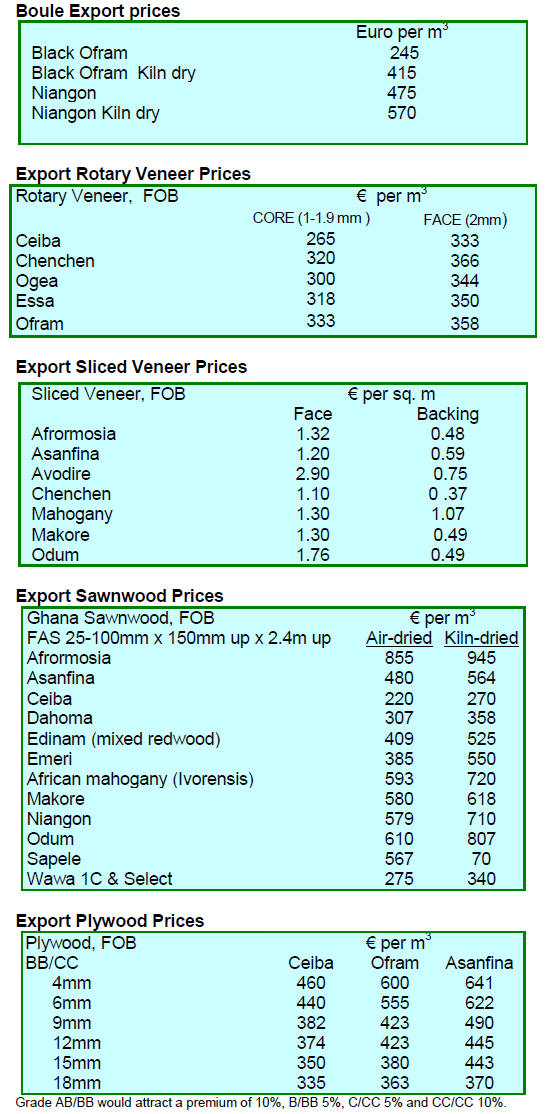
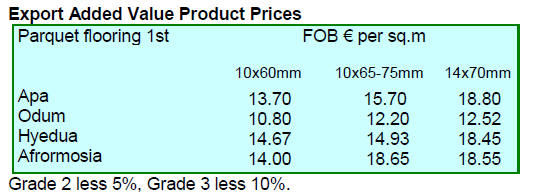
3. MALAYSIA
New tax to affect timber exports
Malaysia plans to introduce a Goods and Service tax
(GST) in April next year. Businesses with an annual
turnover above RM 500,000 will have to register and levy
the new GST on customers. The GST has been proposed at
a rate of 6% and will replace the current Sales and Service
Tax.
Several basic items such as rice, poultry, meat, vegetables,
flour, cooking oil, sugar, residential and agriculture
properties, education and health services will be zero-rated
and exempt from the GST. Some form of rebate is
expected for small and medium enterprises.
Officials from the Finance Ministry fear the biggest hurdle
in implementation is public acceptance of the tax as many
remain concerned that prices will rise once the GST is
implemented.
The Malaysian Timber Council (MTC) recently organised
a briefing for timber and furniture companies on the key
essentials of the GST so as to improve their understanding
of the new taxation scheme how it will affect the timber
and furniture sectors.
Among the concerns raised by participants were queries
on the mechanics of issuing tax invoices and grace periods
for contracts that have already been signed.
MIFF furniture design competition
Preparations are well underway for next year‟s Malaysian
International Furniture Fair (MIFF) with the launch of the
annual furniture design competition. In its sixth year, the
industry‟s leading competition is poised to top last year‟s
record of 244 entries.
Malaysians, foreigners and students residing in Malaysia
under the age of 30 are eligible to compete. In an attempt
to highlight the uniqueness of Malaysian wooden
furniture, this year‟s competition requires the product
designs to be centred on wood as the primary material.
ˇ°By setting wood as the main material for the entries, we
hope that it will enhance awareness among the younger
generation on the eco-friendliness, versatility and beauty
of wood, a material that has helped propel the growth of
the Malaysian furniture industry,ˇ± said MIFF chairman
Tan Chin Huat. MIFF 2015 is scheduled for 3 to 7 March
next year in Kuala Lumpur.
See: http://www.miff.com.my/mifffdc/
Log export prices lifted by Myanmar ban
The log export ban in Myanmar appears to be lifting the
price of export logs from Sarawak. The Star newspaper in
Malaysia reported comments from local logging
companies.
According to Ta Ann Holdings Bhd, prices for keruing
and mixed light hardwood (MLH) logs have increased
since Myanmar stopped exporting logs on 1 April this
year. Ta Ann said the group increased log sales by 30% in
the April-June quarter.
WTK Holdings Bhd reported an almost 7% rise in average
round log prices in the April-June quarter and it took
advantage of the firm price to increase sales. The news of
price increases continued with Jaya Tiasa Holdings Bhd
saying the average price of its logs improved by 18% in
the 12 months to 30 June.
See: http://www.thestar.com.my/Business/Business-
News/2014/09/04/Tropical-log-prices-surge-Myanmarexport-
ban-a-boon-to-Sarawak-timber-companies/
Plywood traders based in Sarawak reported the following
FOB export prices:
Floor base FB (11.5mm) US$ 630-635
Concrete formboard panels CP (3‟ x 6‟) US$530
Coated formboard panels UCP (3‟ x 6‟) US$610
Standard boards
Middle East (9-18 mm) US$465
South Korea (8.5 ¨C 17.5 mm) US$470
Taiwan P.o.C (8.5 ¨C 17.5 mm) US$ 465
Hong Kong US$ 475
4. INDONESIA
Imported timber must be verified legal
Indonesia is proceeding with plans to require imported
wood products to meet the same strict legality standards as
the domestic legality-certification scheme (SVLK) and
expects to begin implementation in 2015.
The Director General of the Foreign Trade Section of the
Ministry of Trade, Partogi Pangaribuan, said official
documents would be finalised by the end of September so
that all timber entering Indonesia shall be verified legal.
ASMIDO chairman Ambar Tjahyono welcomed the plan
as it would ensure exported wood products do not face
market resistance and will eliminate doubts on the legality
of the materials in the manufactured products.
Geothermal development in conservation areas
Indonesia now has a Geothermal Law which opens the
way for development of geothermal resources, one of the
largest in the world.
Many of the geothermal resources are located in forest
conservation areas where development was restricted until
the coming into effect of the new Geo-thermal legislation.
Village forest expanded
The Forestry Ministry has designated 40,000 hectares of
state forest in West Sumatra as nagari (village) forests
over the past three years. Nagari forest is the lowest level
of state territory, overseen through a local communitybased
forest management scheme.
Forestry Minister Zulkifli Hasan officially handed over the
official allocation of nagari production forests to four
nagari, (total area of 18,985 ha) on the sidelines of a
meeting of governors from across Sumatra.
Three of the four nagari are located in Solok regency,
namely Nagari Sirukam (3,398 ha), Nagari Sungai Abu
(6,787 ha) and Nagari Sariak Alahan Tigo (4,300 ha).
Nagari Paru (4,500 hectares) is located in Sijunjung
regency.
Fuel subsidies to eventually go
The issue of fuel subsidies will be at the top of the agenda
of the new government when it takes over in October.
Because of the subsidy Indonesian petrol prices, at around
US$0.56 per litre, are close to being the cheapest in the
world.
Indonesia needs to begin removing the subsidies before
the end of the fiscal year to ease pressure on the current
account thus creating the opportunity for the Central Bank
to concentrate on boosting economic growth.
Fuel subsidies cost the government about US$20 billion a
year and their eventual removal will impact the
manufacturing sector and the competiveness of exports.
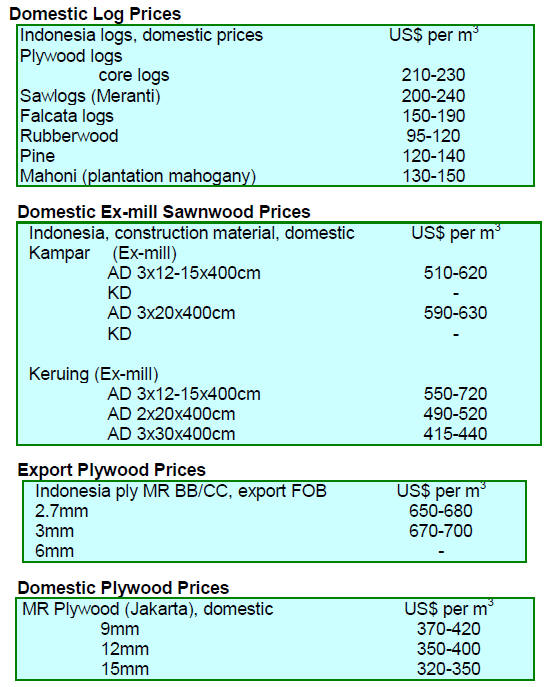
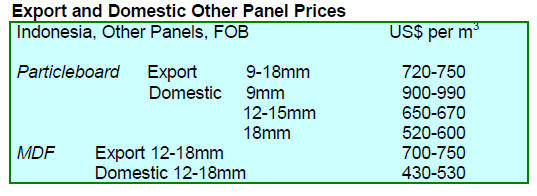
5. MYANMAR
Open tender sales due end September
Sales of logs by open tender for the local processing will
be held at Myanma Timber Enterprise on the 26 and 29
September where about 500 tons of logs will be sold.
For details see the MTE website:
www.myanmatimber.com.mm
The Myanmar Forest Products Joint Venture Corporation
(FJV) sold 2,171 tons of kanyin logs on the 22 August
2014. The average price for the kanyin logs was US$ 537
per H. ton.
Considering that the price for the same timber sold in July
was US$450 ( Myitkyina depot, northern Myanmar) the
latest prices are good. The logs sold recently were of
veneer quality which may explain the better than average
prices. The image below is of the kanyin logs recently
sold.
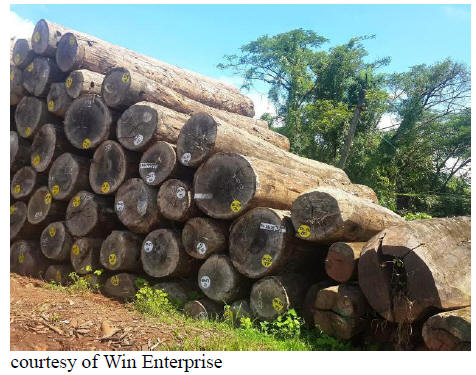
IWPA initiative welcomed but hurdles to trade
persist
The US government has lifted restrictions on US
companies trading with the Myanma Timber Enterprise
(MTE), but restrictions are still in place on certain
financial institutions in Myanmar.
The latest US rule allows for transactions with four banks
in Myanmar; Asia Green Development Bank, Ayeyarwady
Bank, Myanma Economic Bank, and Myanma Investment
and Commercial Bank.
Analysts in Myanmar report that the MTE is finding it
cannot conclude export contracts with US importers as
financial transactions with the bank it uses (not one of the
above four)are blocked. The result of this is that
companies in countries such as Thailand, India and
Vietnam which accumulated large stocks of Myanmar teak
logs before the log export ban in Myanmar can now
readily export Myanmar teak products to the US but the
MTE cannot.
When the US government eased sanctions a few years ago
it authorised the use of a series of general licenses for
financial transactions by US companies and individuals.
Recently, changes were made to the rules on sanctions
which replaced the general license scheme. Information
on this can be found at: www.treasury.gov/resourcecenter/
sanctions/Programs/Documents/fr79_37106.pdf.
This document explains that US individuals and entities
may engage in financial transactions with any non-blocked
Myanmar bank.
One year waiver too short
Companies in Myanmar are saying a one year waiver of
sanctions in the timber trade is too short to develop a
meaningful business as it takes about two to three months
to conclude a contract and another two to three months to
secure and mill the logs.
Even when the order has been processed domestic export
procedures add to the overall time required to ship an
export order. Analysts say a waiver of two or three years
would be more practical to test the efficacy of this
constructive US initiative.
At present almost all export teak and hardwood shipments
from Myanmar are to the EU. One manufacturer in
Myanmar said that, while they can satisfy compliance with
the US Lacey Act, they find it difficult to meet the
stringent quality standards for US orders. At present local
observers say most exporters in Myanmar are more
interested in exporting to the EU than the US.
While there are more than 1,500 timber companies in
Myanmar the number that have the capacity to export is
limited. Moreover, export shipments must be paid for in
advance which is viewed as a major risk by importers.
To reduce the risks to overseas buyers, agents and dealers
have a role to play and may be the key to the reopening of
the US market for Myanmar teak and other hardwoods.
Good quality logs in short supply
Analysts in Myanmar have raised concerns on the quality
of teak logs now available and question if these can yield
sawnwood of a quality to meet international market
requirements.
There are few high quality logs coming onto the domestic
market at present and, say analysts, this is the result of
years of irresponsible harvesting practices and poor forest
management.
The logs now available for sawnwood production are
mainly Sawing Grade 1, 2 and 4 logs. The images below
show recently auctioned SG-2 and SG-4 logs.
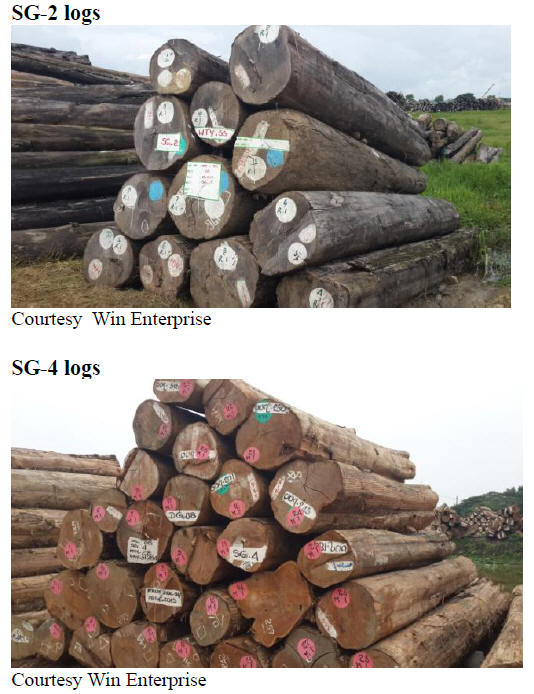
Domestic prices for sawn teak and hardwoods,
Yangon
The following prices per ton of 50 cubic feet and are
quoted for the construction sector.
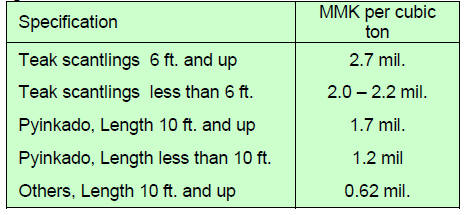
6.
INDIA
Seized sandalwood to be sold for
export
The Andhra Pradesh government has begun the process of
disposing of some of its seized red sandalwood (red
sanders) in the international market.
The state has over 8,550 tonnes of sandalwood seized
from smugglers and around 4,000 tonnes will now be
auctioned to domestic and international buyers.
Red sanders is an endangered tree species found only in
Chittoor, Kadapa, Nellore and Kurnool districts of Andhra
Pradesh. It grows in about 200,000 hectares of forests in
the state.
There is a huge market for red sanders in countries such as
China and Japan where it is used for medicines, furniture,
musical instruments and sculptures.
A single tonne of red sanders can earn as much as Rs.25
lakh (approx. US$41,000) in international markets.
Because it is so valuable the state authorities face a
constant battle to protect trees from be felled illegally.
Incidents of illegal felling and smuggling have increased
in Andhra Pradesh over the past few years and in
December 2013 two forestry officials were allegedly killed
by a group of smugglers in Chittoor forests.
International buyers are showing a keen interest in the
upcoming sale and the state government expects to earn
over Rs.10 billion from the first sale.
The sale of seized red sanders confiscated from
Seshachalam forests will be conducted for six days from
19 September and some 4,160 tonnes in 177 lots will be
for sale through an e-auction.
Red sanders is endemic in Seshachalam, Veliganda,
Lankamala, and Palakonda hill ranges of the state and is
distributed in the Kadapa, Chittoor, and Kurnool districts
in Rayalaseema region and parts of Nellore and Prakasam.
The majority of illegal felling and smuggling of red
sanders takes place in Chittoor and Kadapa.
The Convention on International Trade in Endangered
Species (CITES) has approved India‟s request to export
11,806 tonnes of seized and confiscated red sanders and
the local media have reported that the Director General of
Foreign Trade has issued a notification permitting the state
government export 8,584 tonnes of red sanders wood in
log form by amending the foreign trade policy.
Auctions of domestic teak in Western India
Taking advantage of a spell of dry weather an auction of
2,114 cubic metres of teak and 1,071 cubic metres of other
hardwoods was conducted by the Surat and Vyara forestry
divisions of Western India. Buyers attending the sale
reported the logs offered were smaller than usual but of
good quality.
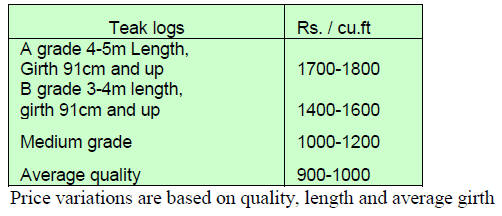
Good quality non-teak hard wood logs such as Haldu
(Adina cordifolia), Laurel (Terminalia tomentosa), kalam
(Mitragyna parviflora) and Pterocarpus marsupium 3 to 4
metres long having girths of 91cms and above attracted
prices ranging from Rs.650-850 per cu.ft.
Medium quality logs were sold at between Rs 500-600
per cu.ft. Lower quality logs fetched between Rs.350-450
per cu.ft.
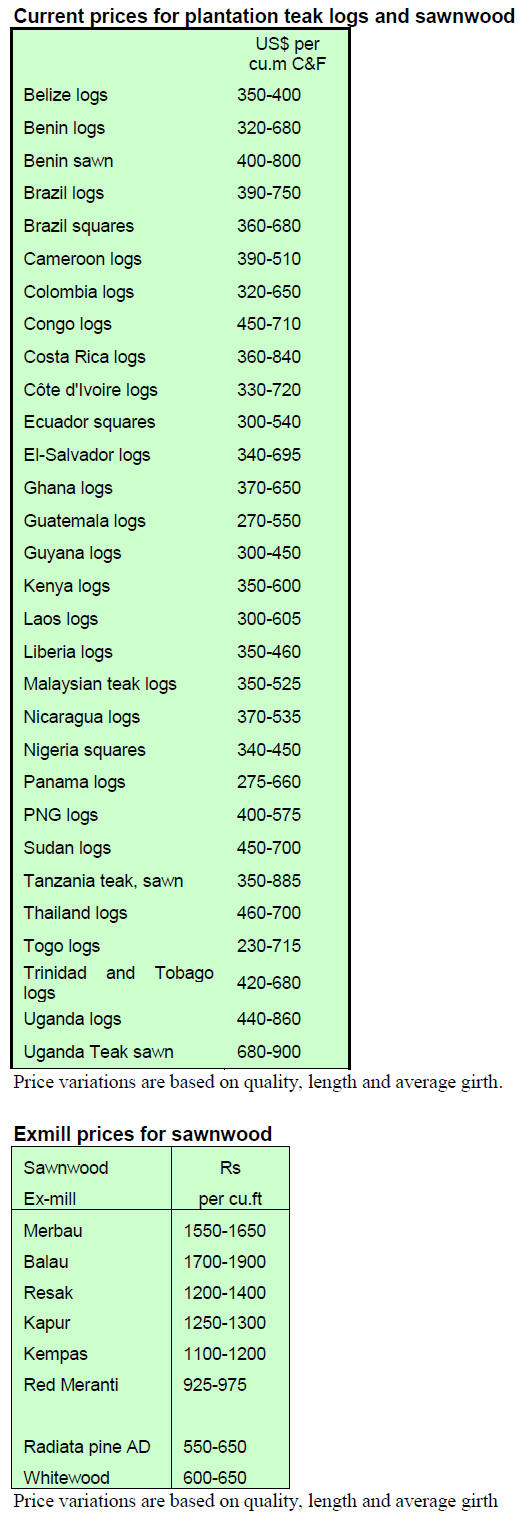
Local mills still have imported teak stocks
Indian sawmillers still have some stocks of Myanmar teak
and are able to satisfy demand at the moment so prices for
sawn Myanmar teak in the domestic market in India have
not changed since last month.
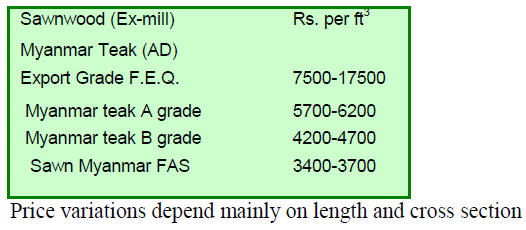
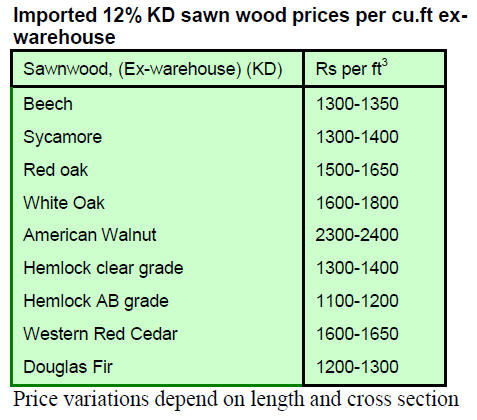
Laminated plywood prices driven up
Manufacturers of paper laminated plywood have increased
prices by 3-4% due to rising costs. Plywood manufacturers
across the country had hoped for an opportunity to raise
prices on the back of improved business sentiment
especially in the housing sector but this has not
materialised.
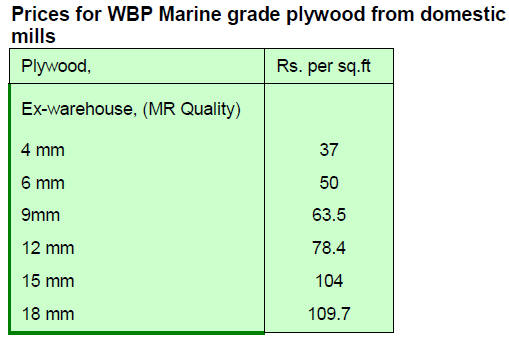
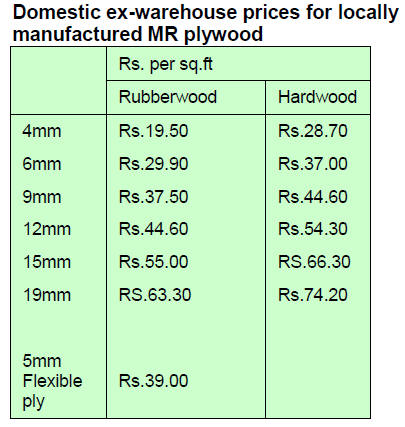
7.
BRAZIL
Exports set to rise in second half 2014
Brazilian plywood manufacturers anticipate exports to the
US could increase in the second half of the year due to
higher spending on civil construction which increased
7.5% in the second quarter of this year.
According to the Brazilian Association of Mechanically-
Processed Timber Industry (ABIMCI), the Brazilian
industry´s optimism has its foundation in the tripling of
plywood exports to the US since March this year.
However, Brazil‟s fluctuating exchange rate is of concern
to entrepreneurs.
The dollar was around R$ 2.25 in April but the industry
would like to see a rate between R$ 2.70 and R$ 2.80.
According to ABIMCI, exports of plywood to other
markets such as Turkey have been falling but efforts are
being made to expand markets in Egypt and Saudi Arabia.
While prospects in international markets are improving
growth of sales in the domestic market is weak.
According to the Civil Construction Industry Union of São
Paulo State (SINDUSCON-SP) domestic civil
construction is expected to only grow between 1% and 2%
in 2014 against the 2.8% previously forecast. Weak
domestic demand will mean more wood products could be
made available for export which could affect price
stability.
ABIMCI will hold a national meeting with plywood
manufacturers in October to discuss market issues,
products standardisation, certification and to develop
strategies for the domestic and international markets.
Investors see opportunities in plantation expansion
Brazil‟s forest sector has developed in the last two years
helped by a National Policy for Planted Forests and also
by the creation of a new broad based association, the
Brazilian Tree Industry (IBA).
According to IBA, the area of planted forests in Brazil is
expected to double by 2020 a target questioned by foreign
investors given the complex legal issues involved.
A recent conference provided a good opportunity for
discussions on expanding pine and teak plantations. A
report from the largest private teak plantation project in
Brazil attracted the attention of potential investors.
Rio de Janeiro the main market for teak furniture
Rio de Janeiro State is the main market for teak furniture
manufactured in Mato Grosso State taking around 40% of
the teak furniture from the state.
The first teak furniture manufacturer in Mato Grosso
began work in 2006 and produced souvenir items as well
as napkin and pencil holders to hand out as gifts to
business partners and customers.
In Brazil sawn and kiln dry plantation teak is sold for
between R$3,500 to R$ 4,000 per cubic metre and is now
used to produce a wide range of products.
Teak sawnwood is produced mainly in the municipalities
of São Jos¨¦ do Rio Claro and Alta Floresta, both in Mato
Grosso state.
Deforestation increases in the Amazon
According to the Brazilian National Institute for Space
Research (INPE) the deforestation rate in the Amazon
amounted to was 3,036 sq. km between August 2013 and
July 2014, an increase of 9.8% year on year.
The deforested area was assessed through the Real Time
Deforestation Detection System (DETER), a technology
managed by INPE to analyse forest degradation and clear
cutting in the the Amazonian states of Acre, Amap¨˘, Par¨˘,
Amazonas, Mato Grosso, Rondônia, Roraima, Tocantins
and part of Maranhão.
To calculate the annual deforestation rate from clear
cutting INPE uses the Amazon Deforestation Monitoring
Project (PRODES) system which provides high resolution
satellite images showing even small deforested areas.
The deforestation data released by INPE shows a forest
loss of 535 sq. km in June and 729 sq. km in July. Par¨˘
state had the highest rate of deforestation followed by the
states of Mato Grosso and Rondônia.
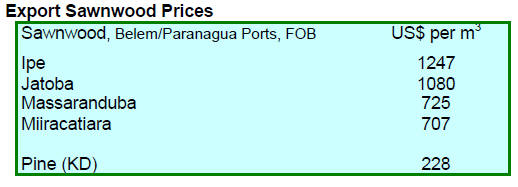
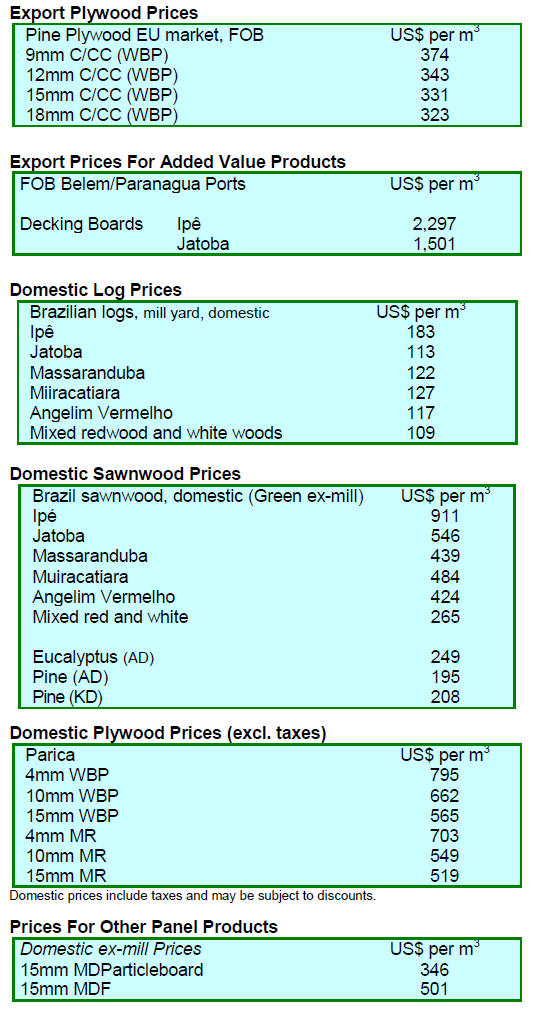
ˇˇ
8. PERU
Tax benefits mulled for forestry
Minister of Production, Piero Ghezzi, has revealed that his
Ministry and the Ministry of Agriculture and Irrigation are
planning to offer the forestry sector the same benefits
provided to agriculture under the Agricultural Promotion
Act.
The Ministry of Production will select a consultant to
identify the competiveness of Peruvian wood product
exports since the wood processing industries have the
potential to contribute more to the countrry‟s finaces and
overall economic growth.
SERFOR begins evaluation of contribution to economy
The National Forest and Wildlife Service (SERFOR) has
initiated a review of the contribution of forestry to the
economy. Various agencies have been brought together to
assess the economic resources and services of the forest.
Visit of Finnish forest sector entrepreneurs
A delegation of Finnish businessmen and forestry sector
academics met with the Minister of Agriculture during a
recently concluded Peru-Finland Forestry Seminar. The
Finnish forestry companies introduced the latest
technology in, and Finnish experience of, sustainable
forest management and forestry education.
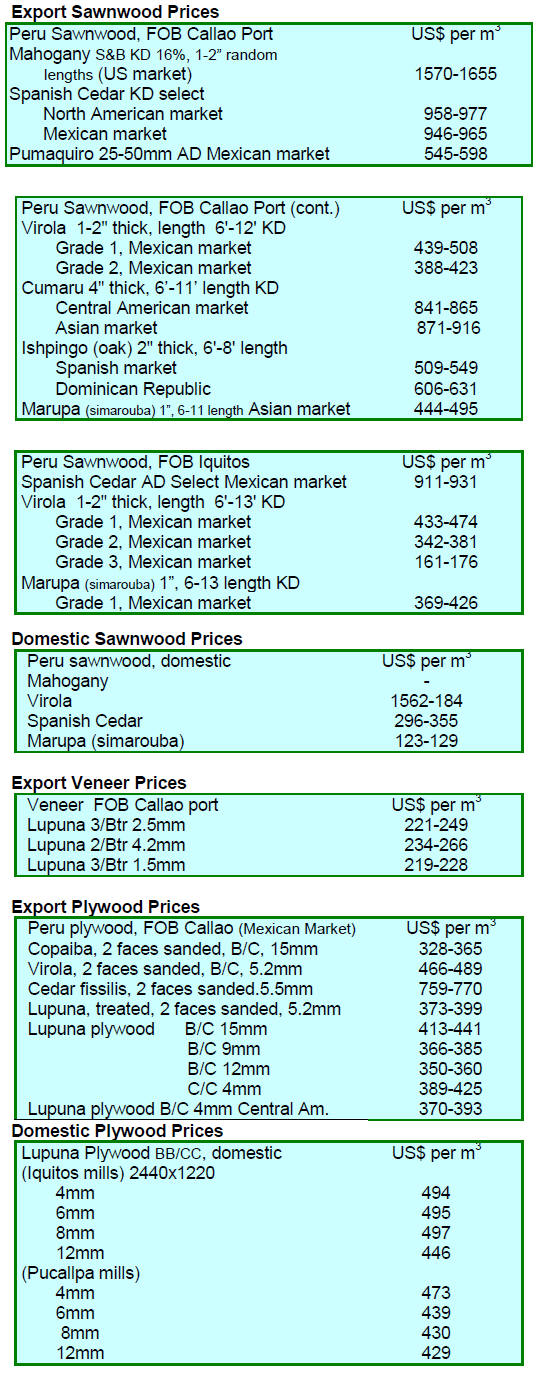
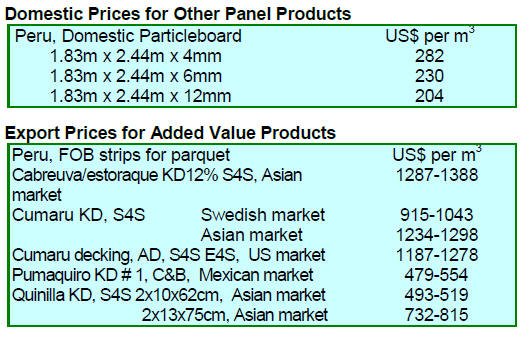
9.
GUYANA
Encouraging first half 2014 production
In the first half of 2014 the performance of Guyana‟s
forestry sector improved compared to the first half of 2013
due mainly to a good performance of the sawnwood and
plywood industries according to the review conducted by
the Ministry of Finance and the Guyana Forestry
Commission.
See:
http://www.nre.gov.gy/PDF/Setting%20the%20Record%20Strai
ght%20on%20the%20Forestry%20Sector/Forest%20Sector%20P
erformance%20Improve%20over%202013%20half%20year%20
owing%20to%20Timber%20and%20Plywood%20Sub%20Categ
ory%20Increase.pdf
The review says production logs, sawnwood and
roundwood (piles and posts ) increased from 151,151
cubic metres in the first half of 2013 to 238,411 cubic
metres in the first half of 2014.
Log production rose 77%, driven by an increase in output
of prime such as greenheart and wamara as well as lesser
utilised species.
Plywood and veneer production accounted most of the
increased output with the timber and plywood sub sectors
recording a 53% increase in export volumes in the first
half of this year.
The report on the forestry sector says: ˇ°The forest sector
has shown a strong performance so far in 2014. As
reported by the Ministry of Finance in the half year
summary, this provides strong basis for revising the
projected increase in forest sector growth for 2014.
Further, as noted in the Ministry of Finance half yearly
report, plywood production is one of the main drivers of
the growth in the sector with a 65% increase in production
recorded in the first half of 2014.ˇ±
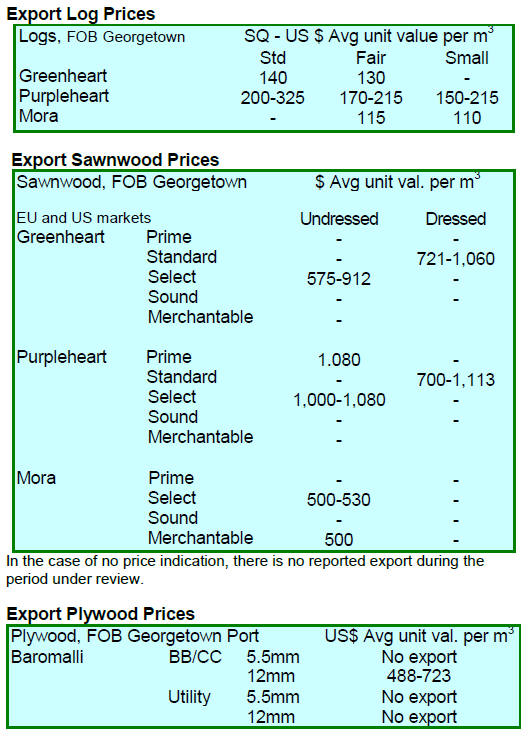
ˇˇ
